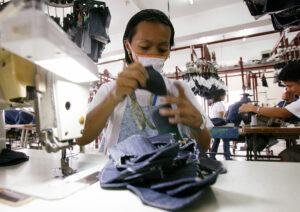EXPORTERS said they need to be consulted more as the Philippines negotiates a free trade agreement (FTA) with the European Union (EU), adding that previous trade deals were concluded without their input.
“It is important that when we negotiate trade agreements, and that’s why we’re saying, the private sector should be involved, the players. In the past, we have had trade agreements that is laid out to us, and it’s too late to complain,” according to Philippine Exporters Confederation, Inc. (Philexport) President Sergio R. Ortiz-Luis, Jr.
Speaking to reporters on the sidelines of the launch of the United Nations Development Programme Investor Map for the Philippines on Tuesday, Mr. Ortiz-Luis said the Philippines was “late” in tapping the European market’s potential and needs an FTA to revive its flagging wearables industry, as well as to support agriculture and forestry producers.
The Philippines and the EU this week announced the resumption of their FTA talks in Brussels. FTA talks stalled in 2017 due to concerns over the human rights record of former President Rodrigo R. Duterte.
In January, exports of agro-based products grew 17.7% to $430.39 million, but wearables exports suffered a 19% contraction to $82.4 million.
Philexport also called on the government to address non-tariff barriers and other challenges that exporters face. These include ease of doing business issues, shipping costs, unstable policy, and port congestion.
“Whenever we go out to attract investment, to attract buyers, what they say is, they’re afraid of our arbitrary rules,” Mr. Ortiz-Luis said.
He also said that the government must ensure the enforceability of contracts, and ensure that its sustainability and labor policies comply with EU standards.
The wearables industry suffered employment declines of 2% and 13% in 2022 and 2023, losing European orders to Vietnam, which had signed an FTA with the EU, Confederation of Wearable Exporters of the Philippines Executive Director Ma. Teresita Jocson-Agoncillo said last month.
The EU is the Philippines’ fourth-largest trading partner with trade in goods worth 18.4 billion euros in 2022, and trade in services worth 4.7 billion euros in 2021, European Commission Executive Vice-President Valdis Dombrovskis said on Monday. — Beatriz Marie D. Cruz
